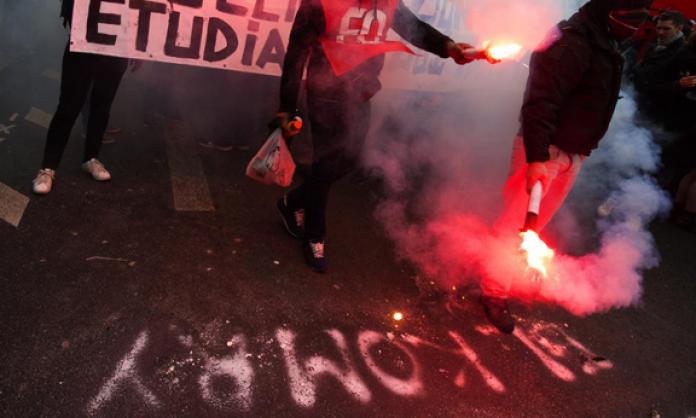Demonstrations, high school pickets and strikes against the Socialist Party’s proposed assault on the labour code spread across France on 9 March.
The attacks would pave the way for longer working hours and lower pay and make it easier for bosses to fire employees. And by increasing the length of the working day for some, they would raise unemployment for others.
“The explanations are always the same: this code is too cumbersome, too complicated”, Isabelle Garo, a left wing scholar, told the radio station France Culture in January. “The code is an impediment to employment, Medef [the top business federation in France] declares. This claim has been repeated continuously by the government, media and self-proclaimed experts.”
The proposed attack is significant. Gerard Filoche, a left wing member of the Socialist Party, and author of How to resist the demolition of the labour code, described labour minister Myriam El Khomri’s proposal on his website as an “ultra-liberal challenge to decades of trade union and left wing struggle to protect wage earners. Even the bosses have been surprised by this draft bill that goes further than what the right has done”.
The labour code was adopted in 1910. It came after the horrific Courrières mining disaster in Pas-de-Calais. In March 1906, an underground explosion killed more than 1,000 workers. While injured or unconscious survivors remained in the pits, the company demanded that production continue. It stopped searching for victims and walled off part of the mine where workers were still alive. Well over a week later, 14 survivors, who had been buried alive, surfaced.
“For 100 years, the labour code has been written so that human rights to work aren’t entirely subject to the blind demands of the market, profitability and competition”, Filoche wrote. “It is an exceptional code, which is made of bloody struggles, sweat and tears, it is the product of … strikes, occupations, demonstrations, negotiations and laws of the Republic. For, we should say it again, in a business, there is no equality between the two co-contracting parties, boss and wage worker: in the labour contract, there is inequality, the wage-labourer is subordinated … and it is for that reason that there is a ‘counter-weight’, a specific code of rights”.
But the bosses hate the idea of protections for workers. For the last 10 years, they have been trying to dismantle the code. The head of Medef, Laurence Parisot, went so far as to say in 2006, “The freedom of thought stops where the labour code begins”.
According to a poll featured in Le Parisien dimanche, 70 percent of respondents oppose the attack on the labour code; 65 percent think that the code should be strengthened.
An early indication of the mood came shortly after the government outlined the proposal. An online petition against the bill was launched, attracting close to 1 million signatures. By contrast, a government petition could muster only 10,000 signatures.
The demonstrations were called by trade unions, student groups and the left. The demand is simple. Philippe Martinez, leader of the General Confederation of Labour, a national trade union, said: “We want the draft law withdrawn so we can start afresh with a law that protects employees”.
Further actions are planned for late March.










